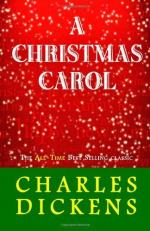|
This section contains 4,024 words (approx. 11 pages at 400 words per page) |

|
In the following essay, Morris examines Ebenezer Scrooge's "conversion" in A Christmas Carol. According to Morris, "Dickens does not intend Scrooge's awakening to be a promise for all covetous old sinners, but only a possibility to be individually hoped for."
As everyone knows, being called a "scrooge" is bad. When labeled like this, one is considered "a tight-fisted hand at the grindstone.... Hard and sharp as flint, from which no steel had ever struck out generous fibre; secret, and self-contained, and solitary as an oyster." In reality, and in short, one is a party-pooper, afflicted with general overtones of inhumanity.
This is the popular definition of the word Scrooge, and it is unfairly the usual description of Charles Dickens' Ebenezer Scrooge, of A Christmas Carol. Scrooge's conversion to a permanent goodness, which is every bit up to those impossible standards met by the totally admirable Cheerybles and...
|
This section contains 4,024 words (approx. 11 pages at 400 words per page) |

|




